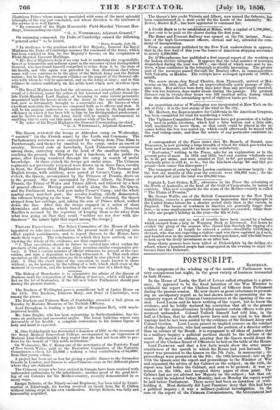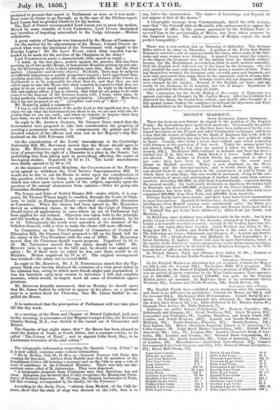POSTSCRIPT.
SATURDAY.
The symptoms of the winding up of the session of Parliament were very conspicuous last night, in the great variety of business transacted in both Houses.
In the House of Lords, the Earl of LIMAN called attention to a griev- ance. It appeared to be the fixed intention of the War Minister to withhold the report of the Chelsea Board of Officers from Parliament during the present session. He now shows as great reluctance in present- ing an exculpatory report as he had shown haste in presenting the in- culpatory report of the Crimean Commissioners at the opening of the ses- sion. Lord Lucan said he knew nothing of the report, but he knew the evidence, and he boldly declared his conviction that all or the greater number of the animadversions levelled against certain officers were pro- nounced unfounded. Colonel Tulloch himself had told him, in the hall at Chelsea, that he should never have said one word to his disad- vantage had he not been misled by the evidence of Sir Richard Ailey and Colonel Gordon. Lord Lucan passed an implied censure on the conduct of the Judge Advocate, who had assumed the position of a director rather than an. adviser of the Board : it is repugnant to all ideas of justice thaf in a military inquiry a political partisan should be the adviser of the court. He moved an address, praying that the Queen would direct the report of the Chelsea Board of Officers to be laid on the table of the House. Lord PANWIRE said that a few facts would show the utter unrea- sonableness of the speech to which the House had ,just listened. The report was presented to the Queen on the 7th July, in manuscript ; the proceedings were presented on the 9th ; the 10th intervened ; late on the 11th the Queen sent the report and proceedings to the Minister of War and requested the advice of her Cabinet on the subject ; on the 12th, the report was laid before the Cabinet, and sent to be printed ; it was re- turned on the 15th, and occupied thirty pages of close print. The Cabinet had not yet advised her Majesty on the subject ; but that ad- vice would be tendered before Monday, and on Monday the report would be laid before Parliament. There never had been an intention of with- holding it. Most distinctly did Lord Panmure deny that this had been a political inquiry ; it was a military-judicial investigation. In the case of the report of the Crimean Commissioners, the Government had promised to present that report to Parliament as soon as it was made : there were no forms to go through, as in the case of the Chelsea report. Lord Lucan had no ground whatever for his motion. The Earl of DERBY recommended Lord Lucan not to press the motion. Moved by some remarks of Lord CassefieLL' Lord Lucius disclaimed any intention of imputing misconduct to the Judge A.livocate.-liotion withdrawn.
A great variety of business was transacted by the House of Commons.
On the motion for the adjournment of the House, Colonel Grune in- quired what were the intentions of the Government with regard to the Foreign Legion ? Sir DE LACY Evesrs asked what requital was in- tended to be made for the services of the Chaplains in the Army ?
Lord EssztraisTors made a characteristic little speech in reply-
" I must, in the first place, protest against the practice that has been rowing up of late in this House, of honourable Members getting up and ask- ing the Government what is their intention upon this, that, and the other matter. (Laughter and derisive cheers.) No doubt, there may be subjects of sufficient importance to justify prospective inquiry; but I apprehend that, speaking generally, the position of the responsible advisers of the Crown in arliament is to be responsible for what they do2 and that they are not called upon to take this House into their counsels in regard to what they are going to do on every small matter. (Laughter.) In reply to the honour- able and gallant officer, I beg to observe, that what we are going to do with respect to the disposal of the German Legion will, I trust, when done, be found perfectly consistent with law and propriety. (Laughter.) More than this I am not prepared to say." (Laughter and cries of " Hear 1") Mr. ROEBUCK added a comment-
" I beg to call the attention of the noble Lord to this significant fact, that when we ask what the Government are about to do, we are met with the ob- jection that we are too early, and when we venture to inquire what they have done, we are told that we are too late." (Laughter.)
In reply to Mr. ARTHUR GORDON, Sir GEORGE GREY stated that the Government were prepared to take into consideration the propriety of erecting a permanent memorial, to commemorate the gallant and self- devoted conduct of the officers and men lost in her Majesty's ship Bir- kenhead on the 25th February 1852.
On the consideration of the Lords' Amendments to the Cambridge University Bill, Mr. Bouvrfise moved that the Howse should agree to them. Mr. HEYWOOD moved an amendment OR clause 44, with the view of preserving the right of a Dissenter to a place in the Senate, but prohibiting him from taking part in proceedings affecting the coarse of theological studies. Negatived by 92 to 71. The Lords' amendments were finally agreed to by 90 to 73.
At the instance of several Members, the CHANCELLOR of the L'ECHE- RuER agreed to withdraw the Civil Service Superannuation Bill. It would not be fair to ask the House to enter upon the consideration of this question without its being in possession of the detailed evidence which was taken upon various parts of the subject, especially upon the question of the annual abatements from salaries.-Order for going into Committee discharged.
The Leases and Sales of Settled Estates Bill-under which, it is sup- posed, Sir Thomas Wilson might be enabled, through the Court of Chan- cery, to build on Hampstead Heath-provoked considerable discussion in Committee. When the clauses had been agreed to, Mr. HADFIELD moved an additional clause, to the effect that the Court of Chancery should reject all applications in cases where an act of Parliament had been applied for and refused. Objection was taken both to the principle and the wording of the clause - but it was carried, on a division, by 84 to 42. Subsequently the words were amended, at the instance of the Solicitor-General, with a view to make the clause still more effectual.
In Committee on the Vice-President of Committee of Council on Education Bill, Sir GEORGE GR.EY proposed to fill up the blank left for the salary of the Vice-President with the sum of 20001. Mr. IT.s.nrresn moved that the Chairman should report progress. Negatived by 91 to 30. Mr. THORNELY moved that the salary should be 1200/. Mr. HENLEY (who is opposed to the bill) said, he should vote against any salary ; for if there were no salary he was sure there would be no Minister. Motion negatived by 78 to 47. The original arrangement was retained-the salary not to exceed 2000/.
In reply to Mr. ROEBUCK' Mr. J. D. Frrzomusis stated that the Tip- perary Bank ease having disclosed the existence of a very great defect in the criminal law, owing to which mere frauds might pass unpunished, it was his intention early next session to introduce a full and complete measure, which would, he hoped, meet all cases of fraudulent appro- priations.
Mr. ROE13UCK formally announced, that on Monday he should move that Mr. James Sadleir be ordered to appear in his place, as a prelimi- nary to a motion fixed for Thursday, that Mr. James Sadleir be ex- pelled the House.
It is understood that the prorogation of Parliament will not take place till this day week.



























 Previous page
Previous page